Chinglish // The Ones You Have to See to Believe
The equation is simple : Chinese + English = Chinglish
But what is Chinglish?
Let’s get a dictionary definition:
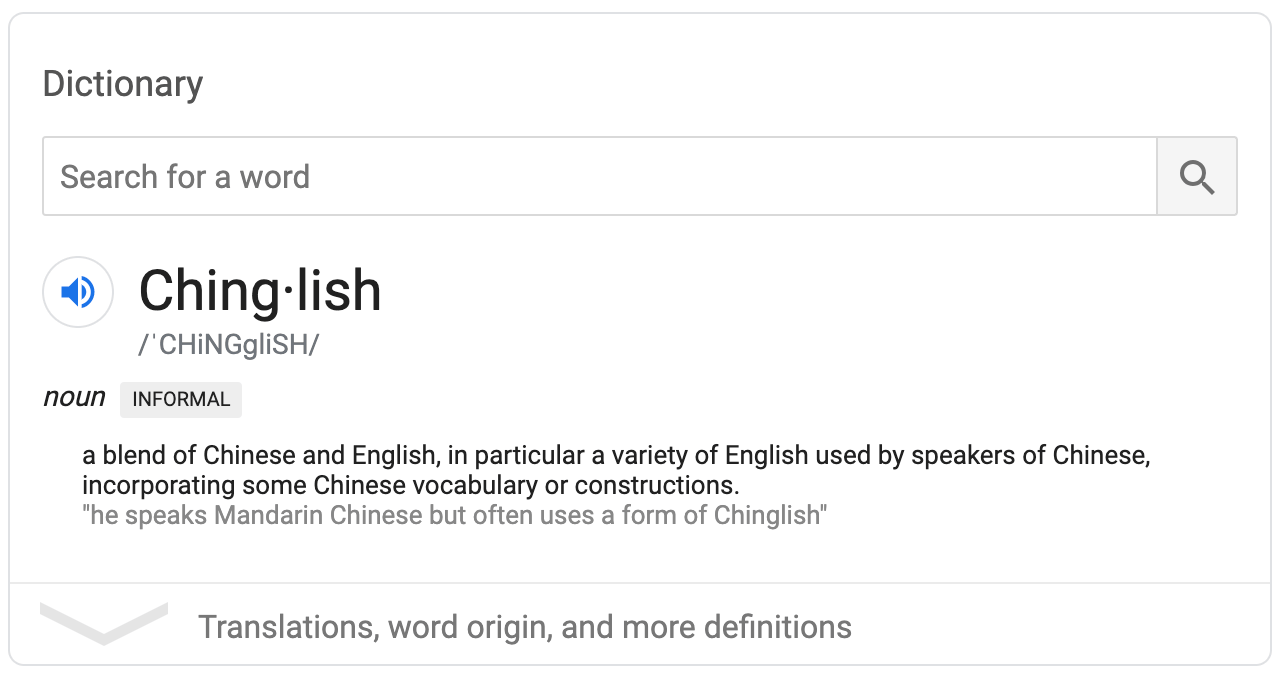
In a nutshell it’s a form of English spoken by Chinese natives.
Seems harmless enough right? That said, if you come to China you’ll without doubt have a rather hilarious run in with Chinglish somewhere down the line.
They generally come in the form of warning signs at tourist spots or on the road, or perhaps in a Chinese menu. Everyday activities breed opportunities for seeing some fantastic examples of Chinglish.
If you’ve been to China, you’ll be fully aware, if you’ve not, you are about to be enlightened.

Things That Shocked Me About China
Culture Shock in China can happen to anyone at any time, and it affects everyone differently. China, however, is in a whole different league. We explain why.
But whether you’ve been to China or not, you may not have seen Chinglish quite as good as these!
Let’s delve into the BEST CHINGLISH WE’VE EVER SEEN!
Discover Chinglish | Chinglish in China
Discover Chinglish | Chinglish on Menus
Discover Chinglish | Chinglish on Clothing
Chinglish in China
#1 – Fall Carefully
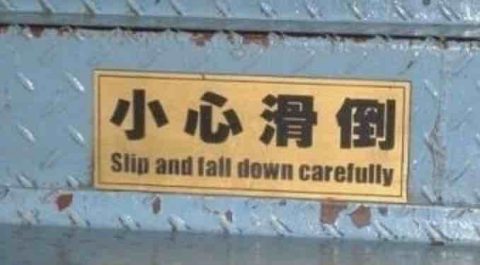
Be careful when slipping over!?
Let’s break this down and see what they actually meant to say:
- 小心 – careful
- 滑倒 – slip and fall
Sounds like the literal translation is bang on but the thing to learn here is that many things do not translate between Chinese and English well at all.
Sometimes it just sounds plain awkward or plain wrong, and this is a good example.
We think – BE CAREFUL, DON’T SLIP OVER might be a better alternative – 小心,不要滑倒
Either way, take care of the weather in China, and watch your step!
#2 – Deformed Man’s Toilet
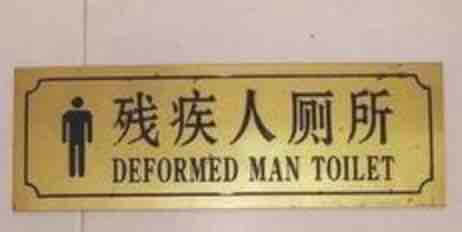
You’ll have to look twice, even thrice at many of these titles and images.
That’s Chinglish for you!
Deformed Man Toilet, it’s really a thing in China. What did they mean to say though?
- 残疾 – Disabled
- 人 – Person
- 厕所 – Toilet
The intentions are clear and no offence was meant, but that doesn’t stop it being any less shocking upon first, second and even third glance!
So the Chinese is fine, but they just need to brush up on their English skills here!
#3 – Tiny Grass Dreaming
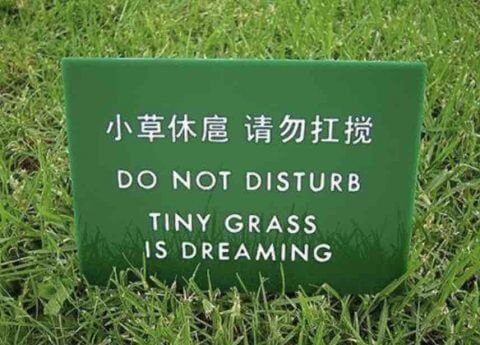
Excuse me?
Tiny grass what now?
It’s hard to even guess what they meant to say when breaking this one down!
- 小草体扈 – Small Grass
- 请勿扛搅 – Do not disturb
There doesn’t appear to be a mention of anything to do with grass dreaming in Chinese here.
Likewise we’re not sure why the grass is labelled small either. Too many questions, not enough answers.
We still aren’t quite sure why the grass must remain un-disturbed but there you go!
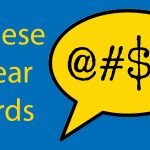
I Learnt 55 Swear Words From Native Chinese Speakers
Chinese swear words are the most exciting thing for newbies is learning how to say bad things. Here are 55 I learnt from native speakers.
#4 – The What with the Fruit?
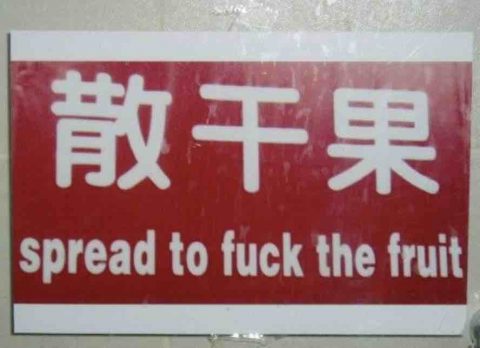
Oddly enough you’ll find the usage of F#ck in a lot of Chinglish.
Why, we don’t know.
This is one of many examples using derogatory terms in English. Perhaps one day, it’ll click!
- 散 – Spread/Break-up/Disperse
- 干 – Dry or (to do something)
- 果 – Fruit
When breaking this down character by character you can kind of see how they got to where they did, but still… come on.
In theory this should just read something like Dried Fruit (broken into pieces).
But this is China we are talking about!
#5 – Beware the Racist Park
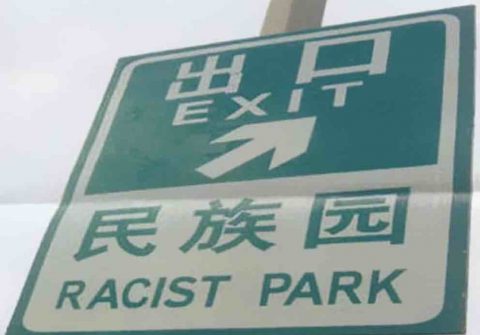
Oh China, just a little bit of research is all it takes.
Something so innocent becomes an Internet sensation. You only had one job!
This is a simple one also in all honesty:
- 民族 means Ethnic Group/Nationality
- 园 means park
Yet they found Racism somewhere in there, ouch!
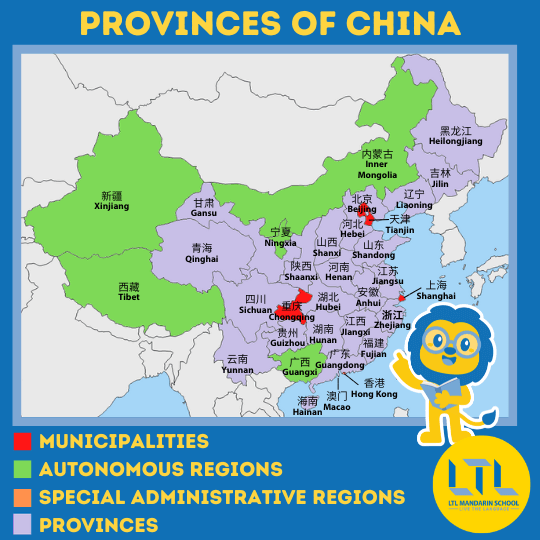
#6 – Interesting Kind of Hall

Probably one of the more instantly hilarious ones you’ll come across upon first glance!
This is an interesting one to break down because in theory, it’s all correct but let’s explain:
- 大 – Big
- 操 – To Grasp (but also f*ck)
- 厅 – Hall
You can see where the mess up happened here.
In Chinese some characters have two different meanings, adding to the confusion!
That confusion has left them a cropper, but there’s also another couple of interesting angles here.
Firstly the tones – 操 (first tone) means to grasp, but change that to a more aggressive forth tone and it means f*ck. So although in writing it’s the same, the tone (and I guess the possible aggression/context) would give away whether the person meant grasp or f^ck. That said, on a sign, we’ve no way of knowing!
Secondly – As we covered in our Chinese Swear Words blog, there is also another character for F*ck.
肏
Now, break this character down – without getting too vulgar, once you figure out what the top part of the character and the bottom part mean separately (look it up if you don’t know already), you’ll discover a rather eye-opening way to depict the character “f$ck”… we’ll leave it there for now!
Disclaimer – the character 操 generally used much more than 肏.
Absolutely bizarre, but hey, that’s learning Chinese for you! And remember… learn those tones!
#7 – Salty Pig Hand?
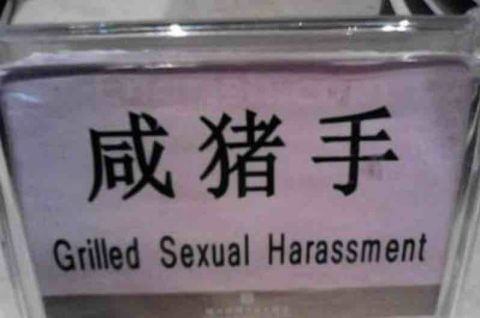
- 咸 – Salty
- 猪 – Pig
- 手 – Hand
Confused? Good, you should be!
However, 咸猪手 does not mean salty pig hand but actually is a term for a someone who gropes people in public, a pervert.
How they got to Grilled Sexual Harassment we aren’t quite sure, and also more worryingly why they felt the need to make a sign in Chinese saying PERVERT, is perhaps more of a pressing issue.
#8 – That Evil Rubbish
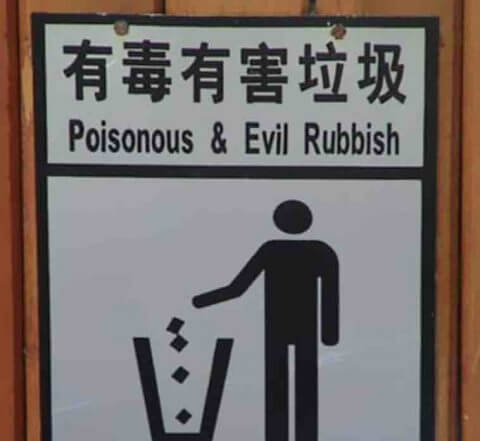
In this instance their Chinese and English translations are virtually on the money, but that doesn’t stop it sounding rather amusing when read in English.
- 有毒 – Poisonous/Toxic
- 有害 – Harmful
- 垃圾 – Rubbish/Garbage
Thanks to the inclusion of the evil we’ve enjoyed a good laugh over this but the right intentions are there and at least they are encouraging locals to put that evil rubbish in the bin!
#9 – That Escalated Quickly!
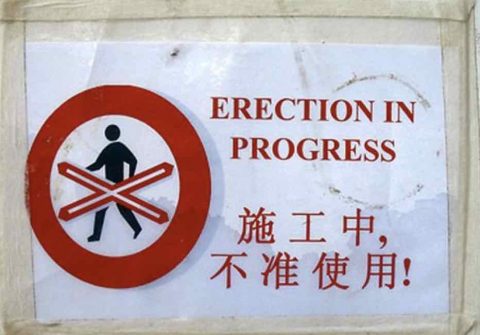
Another one where you need to look twice and more before actually comprehending what you’ve just read!
- 施工 – Construction
- 中 – Middle of/During
- 不准 – Forbid/Prohibit
- 使用 – Apply/Make Use of
Ok so in a nutshell the Chinese here translates roughly to – Not allowed to use during construction
Actually, the English makes sense, the problem in the choice of image used.
You can erect a building, or a statue, but unfortunately the image turns the mind to the other kind of erect!
#10 – Put out the fire, with a hand grenade
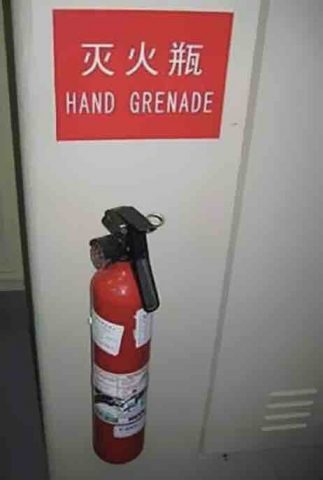
They’ve just got it all wrong here.
Odd really because this is a sign you see absolutely everywhere and it’s generally always correct.
Fire extinguisher.
How hard is it to copy what’s already done? Maybe they just wanted a laugh?!
- 灭 – Put out/extinguish
- 火 – Fire
- 瓶 – Bottle
There is nothing wrong with these Chinese here.
灭火瓶 is Fire Extinguisher, they just need a little help with their English. Either way, it makes for some good Chinglish!
Chinglish on Menus
It’s quite amazing how many restaurants in China (small or big) manage to squeeze in a bit of Chinglish.
Being in China long enough, you start to wonder if they are purposefully in competition for the most bizarre entry. Don’t believe me? Then read on…

Traditional Food in China 🥟 The Top 10 You Simply MUST Try
Traditional Food in China // There is an endless list of incredible Chinese dishes but what are the best? Here’s the top 10 you simply cannot miss.
#11 – Delicious Roasted Husband
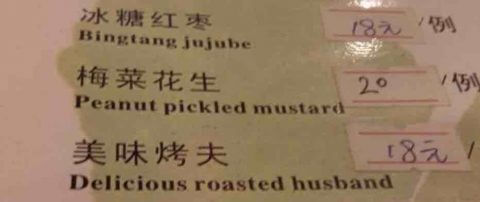
“I’ll take some rice, jiaozi, and two portions of the delicious roasted husband please”
Beggars belief doesn’t it.
How did they even get there?
Let’s try and investigate by breaking the characters down:
- 美味 – Delicious
- 烤 – Roasted
- 夫 – Husband
Well, look at that. The translation is the exact version as to what the menu provides. This falls into the category of just being plain awkward to translate but it still begs that question, what on earth is 美味烤夫
Brave enough to try it out?
It’s worth noting that 烤麸 (same pinyin Kǎo fū, just slightly different 2nd character) translates to steamed gluten/cake… maybe gives some clues as to what the treat is.
Or maybe just confuses us more!
#12 – Political Choice
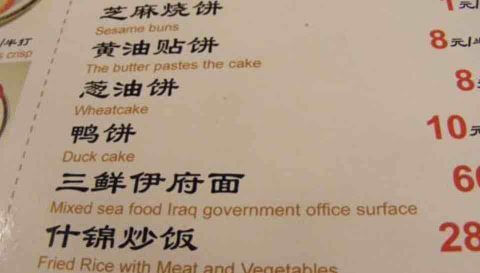
The translation is absolutely way off for this one, but there maybe some slight logic for this which we’ll try and dig into!
三鲜伊府面 broken down are:
- 三鲜 – This basically means three delicacies
- 伊府面 – Yifi Noodles which is a type of Cantonese Egg Noodle
So what the menu is trying to say is this dish is Three delicacies Cantonese Egg Noodles
So where on earth has Iraq Government Office Surface come from?
Well the Iraq can probably be explained by the 3rd character, 伊. Iraq in Chinese is 伊拉克. Note the 1st character matches.
Government in Chinese is 政府. The 2nd character here, matches the 4th in our translation.
Although we are clutching straws here, we can vaguely see a connection, and that will be the case for a lot of these bizarre menu translations.
Still, doesn’t help us much when we are sat down, hungry and wanting to eat something familiar!
#13 – A LOT of Meat
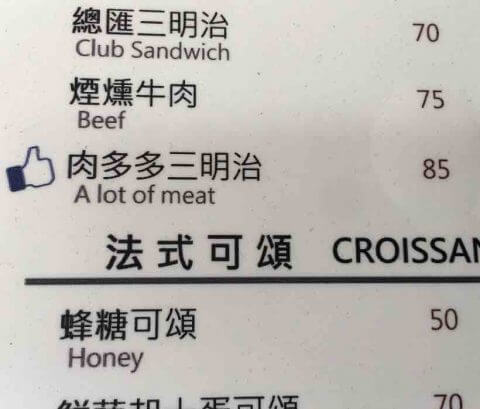
We like this one a lot!
Club Sandwich? Beef? Or just a lot of Meat? Priciest option of the lot also!
They forgot to add Sandwich on the end which might’ve made this clearer for their customers.
- 肉 – Meat
- 多多 – A lot of
- 三明治 – Sandwiches
A wise guess would probably put this as a Meat Feast Sandwich of sorts, who’s hungry?

Living in China as a Vegetarian or Vegan // Is It Possible?
Vegan or Vegetarian in China? Can a Vegan or Vegetarian survive in China? Here’s our top dishes for Vegans and Veggies and some great tips to help you.
#14 – A Way with Words
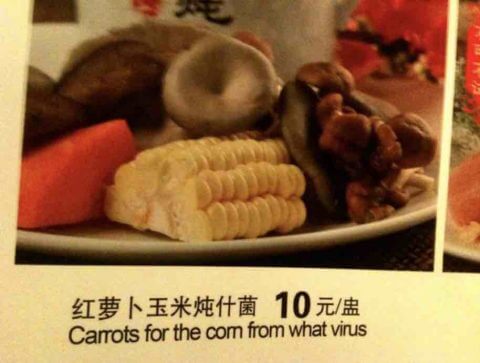
Thank goodness you have the picture here.
At least you have an idea of what your getting because the description of the dish just appears to be a hand selected random mix of any words from the dictionary!
Carrots, Corn and a Virus. Mmm, yummy!
- 红萝卜 – Carrot
- 玉米 – Corn
- 炖什菌 – Stew
Glad we’ve cracked that code. Carrot and Corn Stew.
That said though, the “what virus” can be explained by taking the last two characters:
什 – First part of “what”, 什么
菌 – Mushroom/Fungus
The translator tool they used obviously took it a little too literally and translated every single character, word for word. Bit messy for the menu.
#14 – Branding Gone Wrong
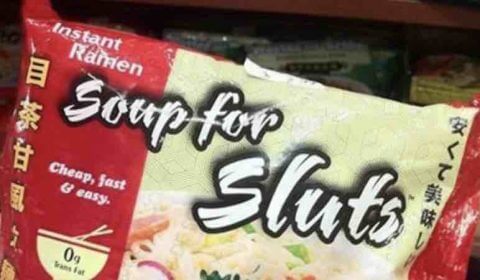
Not quite a menu, but food related.
Bit of a strong one this one.
Huge mess up on the Marketing side of this brand but I suppose at least people are talking about them!
Ramen is a type of Japanese food, hugely popular in China, and around the world actually.
We aren’t sure if this is a Chinese or Japanese brand. Chinese is shown on the left side of the packet, Japanese on the right.
Either way, it’s a jaw dropper of a name!
#15 – Whatever
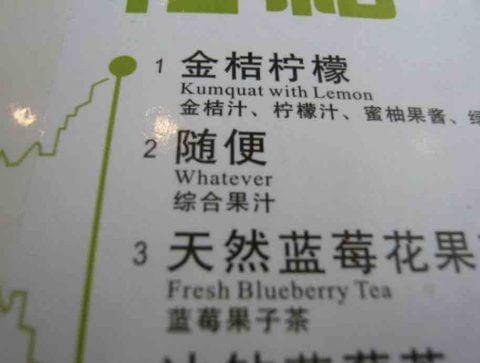
Fantastic.
Can’t be bothered to list what the dish is, just list it as whatever and hope the masses order it.
Funnily enough however, the translation alongside the Chinese characters is spot on.
随便 actually translates to whatever.
It’s a commonly used word you will hear often in many situations.
So why did they list something in the menu as “whatever” in Chinese?
LTL LOGIC – Well there’s a clue in the 4 characters below 综合果汁 means Mixed Fruit Juice – perhaps that whatever refers to the fact you can choose whatever fruit juice you want?
In reality though, only they know!
#16 – Dogsh!t? No?
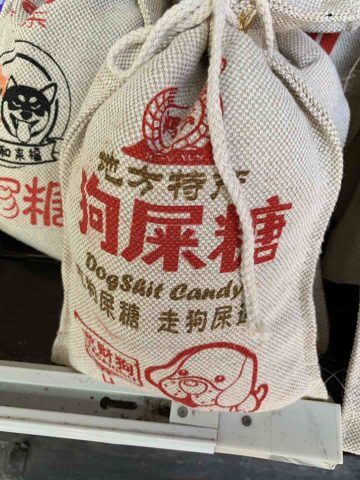
You always feel a sense of pride when you discover some Chinglish whilst being a tourist around.
This gem was spotted by our team on a trip to Wuzhen Water Town, just outside of Hangzhou and not far from Shanghai also.
Dogshit Candy…
We had a laugh, and the staff behind the stall laughed with us but we think perhaps we were on different wavelengths.
狗屎糖 – let’s see how it translates:
- 狗 – Dog
- 屎 – Excrement, faeces
- 糖 – Sugar
Right on the money.
Unfortunately for them, they choose that 2nd character!
#17 – Cannabis for Dinner?
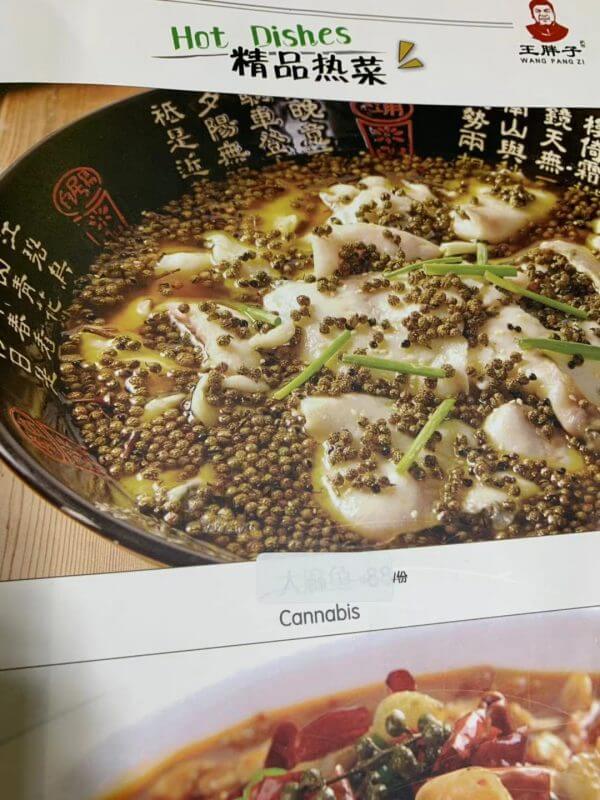
No need to double take, it’s cannabis and it’s on the menu for dinner, apparently?!
Unfortunately they have blanked out the Chinese translation, and the price – why?
Must be sold out, makes sense I guess!
Although we did see the price was 88CNY, funny that, given that 8 is a lucky number in China. What are you trying to tell us here?!
This find actually came from a restaurant in Beijing that sells Donkey meat.
It is located near the Bell Tower by Guloudajie Metro stop 鼓楼大街地铁站 (Line 2/8). If you fancy donkey, or cannabis, head to the following address
Want Cannabis? – 76 Gulou Xi Dajie 鼓楼西大街76号
Chinglish on Clothes
When you go shopping in China, be prepared to discover some rather unusual and interesting brands. After a nice warm North Face jacket? Why not branch out a little and go with the Sexy Face…
#18 – The North Face, rebranded
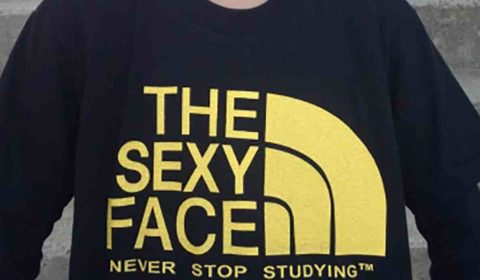
Be prepared for A LOT of famous brands to be rebranded in their own weird and wonderful Chinese way.
Whether the proud owner of these clothes is aware of the resemblance to the famous brand we will never know.
You’ll find yourself physically stopping in the middle of the street many a time to gaze at some of the fantastic motivational quotes, brand names and botched up English on clothing in China.
#19 – Care for a Handshake?
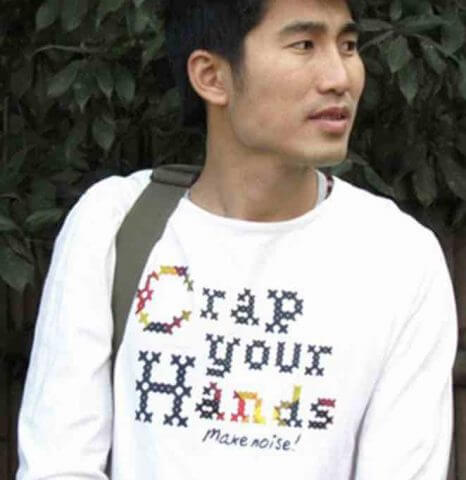
Many different emotions and reactions can be triggered when casting an eye upon clothes in China.
This one absolutely falls in the immediate laugh out loud category.
Nothing subtle about it, and no way he has a clue what he’s wearing.
“It’s in English, so it looks cool.”
Unfortunately my friend, not to anyone who has a basic grasp in English.
There are plenty of like-minded examples of these around. Seen any yourself?
Take a picture and SEND IT TO US!
#20 – Pigs and Cats
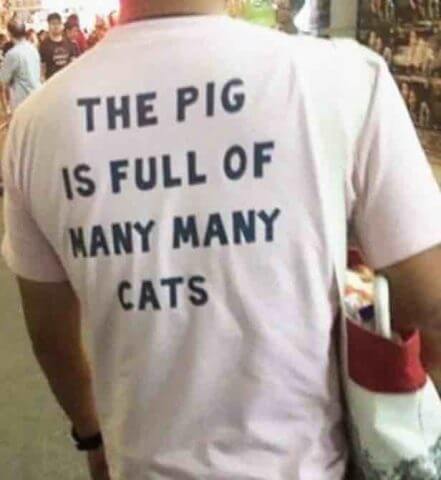
If #17 was a laugh out loud jumper, this falls into the WTF category.
No sense, no meaning, just all rather odd.
A honourable shout out to spelling though! Every word is correct.
You’ll become familiar with many phrases/quotes that not only make no sense, but also are spelt bizarrely and even sometimes with a mixture of languages.
You’ll see singular words including English and the Cyrillic Alphabet of Russian for example. Try de-coding that!?
Hard for even fluent speakers of both languages.
So at least the manufacturer of this beauty had the brain power to nail the spelling, just a shame it makes zero sense.
#21 – Poor Kid
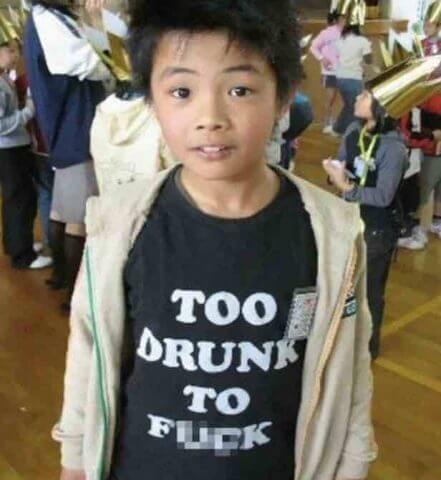
I think the first thought here is pure sympathy for the poor chap.
The parents clearly have no idea what they’ve done to him, but still, that doesn’t make it any easier when he sees his face plastered all over the Internet, and wondering what he did to deserve his new found fame.
A lesson to all parents in China, read (or at least translate) the words before making the purchase!
Again, these items of clothing are more common than you’d think.
The elder and younger generations, most of whom have no grasp of English most commonly get caught up wearing these.
#22 – Think Less
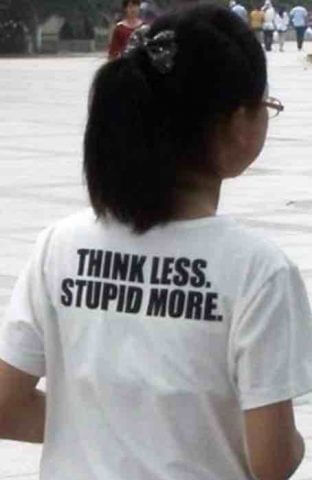
You tell ’em girl.
There’s a beautiful irony about this one.
Just be stupid more and all will be OK!
As stated, you’ll find these ALL OVER CHINA.
Travelling the subway? Walking the street? Off to a tourist hot spot?
Just a few of the places you’ll pick up some great pictures.
A quick Google of Chinglish, Chinglish Menus or Chinglish clothes and you’ll be greeted with even more weird and wonderful examples.
It’s never ending. But for now, we have just one more treat for you, and it’s a good one…
#23 – Place your Orders
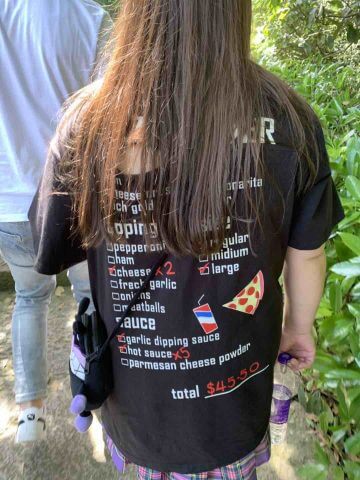
OK so there’s zero Chinglish in this (well they spelt Medium, Midium, but we’ll let that one slip) but it’s too good to not share with you.
Going back to examples #16, this came from the wonderful Wuzhen Water Town again.
What an absolute peach this is.
In effect, it’s a Pizza Menu on the back of a t-shirt but not only that…
It’s actually gone through the hassle to tick off what they want. Hot Sauce, times 5?!
Probably a personal favourite is the price at the bottom has also been filled in.
You wonder who makes these t-shirts, and then who actually buys them!
Either way, she’s rocking it despite the rather expensive pizza!
Anyway, we could go on and on and on and on…
For now though, we’d love to encourage you to send in your very own examples.
Have you seen any?
Drop us a comment and send us in the pictures and we’ll add our best ones in another section below.
Chinglish // FAQs
What is Chinglish?
Chinglish is a mixture of Chinese and English (Chi from Chinese and nglish from English).
I refers to many things seen in China with inaccurate English such as products to eat or wear.
Is Chinglish actually real?
Yes, if you are in China, the likelihood is that you will come across English all the time. Peoples clothes in public environments, fake goods at stalls, any many many more!
Is Chinglish intentional?
As much as these seem like someone having a joke behind the scenes it really isn’t.
In certain parts of China (think way from the big cities), English is never spoken and not very well understood.
Getting hold of correct translations is therefore a challenge and leads to these rather odd translations!
Even in the top tier cities, these mistakes will happen mainly due to lack of effort translating.
We wouldn’t have it any other way!
Is Chinglish common throughout China?
It is indeed, smaller cities probably moreso given the fact English is used much less there, but still even in the behemoths of Shanghai and Beijing, you’ll find it everywhere.
That can include warning signs, clothing or even in Chinese menus.
Want more from LTL?
If you wish to hear more from LTL Mandarin School why not join our mailing list.
We give plenty of handy information on learning Chinese, useful apps to learn the language and everything going on at our LTL schools!
FANCY A FREE HOUR OF CHINESE? Grab yourself a free trial right now!
Sign up below and become part of our ever growing community!


 Hi, my name is Mojca! I am from Slovenia and I work as a student advisor at our Shanghai school.
Hi, my name is Mojca! I am from Slovenia and I work as a student advisor at our Shanghai school.
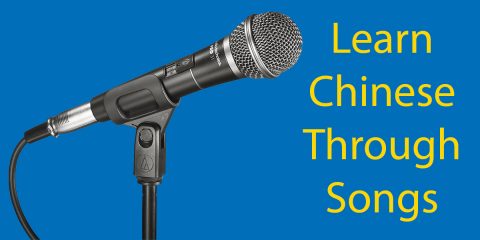



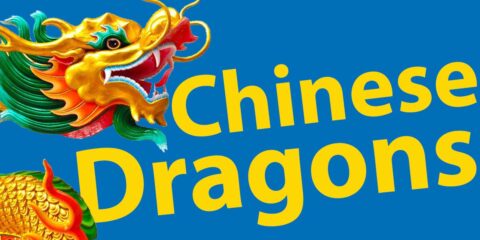

17 comments
[…] like Chinglish and […]
[…] from Chinese “给力(geili)”. Compared with other English words, this “Chinglish” word basically conforms to the rules of English word creation. The only difference is that […]
Some of these are ridiculous, cannot be true
Hard to believe, but they all exist! We see them with our own eyes Ale!
That all can be true, as a Chinese, living in China from since I was born in 1990 to now, I have seen such Chinglish a lot.
Absolutely hilarious read!!!
Ha! Glad you liked it!!
[…] these awkward Chinglish? If you did, then congratulations! If not, that’s totally fine. These Chinglish sentences are understandable, hence acceptable. But if you really want your translation to be […]
[…] (and partners) Tom and Ula, this podcast is the only one out there that advertises itself as a Chinglish […]
This post is hilarious! The examples of Chinglish are so spot on, it's hard to believe they actually made it into signs and menus. 😂 I can't wait to share this with my friends who are learning Chinese; they will definitely get a kick out of it! Thanks for compiling such a fun list!
So good right. Glad you enjoyed them 🙂
This post had me laughing out loud! The Chinglish examples are hilarious and sometimes so creative that they almost make sense. It's fascinating to see how language can get so tangled up. Thanks for sharing these gems!
We LOL'd a lot too!
This post is hilarious! Chinglish can be so confusing and amusing at the same time. I can't believe some of these translations! Thanks for sharing such a fun collection!
🫡
This post had me laughing out loud! Chinglish signs are such a hilarious reminder of language barriers. I can’t believe some of these made it out into the public! Thanks for sharing these gems!
This post made my day! 😂